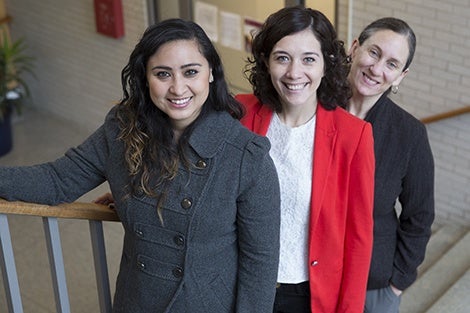January 24, 2017 – For a homeless person who’s cold or hungry or intoxicated, the emergency room is often the first place they’ll think to go to find warmth, a sandwich, or a place to spend the night.
“That’s the place where potentially a person’s needs can be met 24 hours a day,” said Maggie Sullivan, a doctor of public health candidate at Harvard T.H. Chan School of Public Health. But some of these emergency room visits may not truly be medical emergencies. And it’s possible that frequent ER visitors wouldn’t wind up there so often if they had other options, such as getting into a detox program or seeing a primary care provider on a regular basis.
Sullivan is part of a student team trying to develop strategies to improve health outcomes for homeless individuals while decreasing their reliance on emergency department visits and hospital stays. It’s an 18-month project being conducted in partnership with the Boston Health Care for the Homeless Program (BHCHP). The Harvard students are being funded through an Agents of Change grant from Harvard’s Center for Primary Care. Agents of Change grants charge Harvard students to develop innovations in primary health care delivery, in partnership with community health centers.
Sullivan is excited about the project partly because she worked at BHCHP for seven years as a family nurse practitioner before coming to Harvard Chan. Others on the student team include two other doctor of public health students from Harvard Chan School—Paola Abril Campos and Jazmine Garcia Delgadillo—and two Harvard Medical School students.
Helping the very sickest
The students are providing support to BHCHP and eight partner social service organizations in the Boston area as they work to create a more integrated and intense service continuum for the very sickest among the homeless population.
“The people we are trying to help are long-term chronically homeless people who have very little, if any, social support, and who are suffering from what we often refer to as tri-morbidity, which includes severe mental illness, substance use disorders, and chronic medical disease,” said Jessie Gaeta, chief medical officer at BHCHP. “This is a group of people with an unparalleled mortality rate in the U.S.” In addition, health care costs for people in this group can run as high as hundreds of thousands of dollars per person each year, she said.
Gaeta hopes the students will help BHCHP and its partners address the underlying social factors that contribute to poor health among the population, such as the lack of housing.
“The challenges that people who experience homelessness face are many and require a system-wide intervention,” said Campos. “This project will allow us to take a step further in addressing the social determinants of the health of the homeless population through a strong collaboration among different service agencies.”
Analyzing interventions
The Harvard students will create a system to identify and track homeless people in the Boston area who are the most frequent users of emergency rooms and hospitals. They’ll also develop a curriculum and provide training for case managers at BHCHP’s partner organizations in how to best address homeless clients’ health needs. The team will interview case managers on their understanding of the health care system and develop a curriculum intended to teach on-the-ground case managers how to help patients navigate the health care system in a more productive way.
The students also hope to create an online tool that offers case managers immediate feedback on their homeless patients’ health care quality metrics.
Noting that it’s hard for BHCHP, as a nonprofit, to afford high-quality training for its staff and partners, Gaeta said, “This collaboration with Harvard is ideal because we have an incredibly talented and motivated group of graduate students who understand a lot about the health care system helping us.”
The students, for their part, are grateful for the opportunity to work on the BHCHP project. “We are looking forward to helping BHCHP improve access to care for some of Boston’s most vulnerable patients,” said Sullivan.
photo: Sarah Sholes
